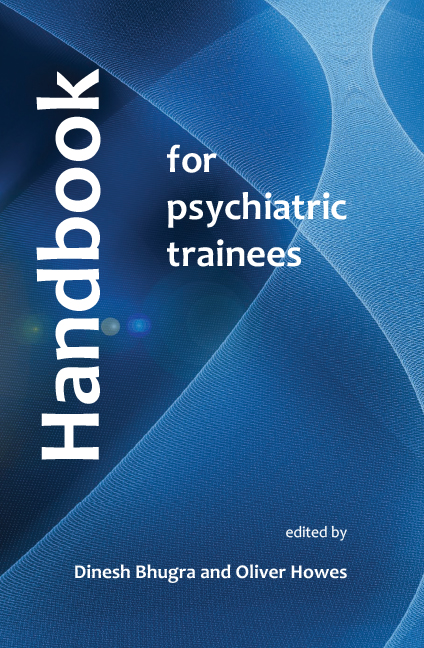Book contents
- Frontmatter
- Contents
- List of tables, boxes and figures
- List of contributors
- 1 Psychiatric training: the next steps
- Part 1
- Part 2
- Part 3
- 14 Personal safety
- 15 Managing violence
- 16 Managing difficult clinical situations
- 17 Understanding and managing stress
- 18 Managing time: the key to professional success
- 19 Negotiation skills
- 20 Presentation skills
- 21 Mental health review tribunals: reports and hearings
- 22 How to get published
- 23 Mental health informatics
- 24 Clinical governance
- 25 Lifelong learning and revalidation
- 26 Mentoring and shadowing
- 27 The MRCPsych examinations
- 28 Flexible training
- 29 UK training for overseas doctors and opportunities for UK doctors to train outside the EEC
- 30 Academic careers
- 31 Higher degrees
- Index
27 - The MRCPsych examinations
from Part 3
- Frontmatter
- Contents
- List of tables, boxes and figures
- List of contributors
- 1 Psychiatric training: the next steps
- Part 1
- Part 2
- Part 3
- 14 Personal safety
- 15 Managing violence
- 16 Managing difficult clinical situations
- 17 Understanding and managing stress
- 18 Managing time: the key to professional success
- 19 Negotiation skills
- 20 Presentation skills
- 21 Mental health review tribunals: reports and hearings
- 22 How to get published
- 23 Mental health informatics
- 24 Clinical governance
- 25 Lifelong learning and revalidation
- 26 Mentoring and shadowing
- 27 The MRCPsych examinations
- 28 Flexible training
- 29 UK training for overseas doctors and opportunities for UK doctors to train outside the EEC
- 30 Academic careers
- 31 Higher degrees
- Index
Summary
The Royal College of Psychiatrists developed its Membership examinations, widely abbreviated to the MRCPsych examinations, shortly after the College was founded. In June 1971 Professor Trethowan, the then Chief Examiner, arranged for the first part I examination to take place in November 1971 and the first part II examination in February 1972. Previous to that time the only further specialty qualification in psychiatry available to psychiatric trainees was the Diploma in Psychological Medicine (DPM). This diploma was issued by the Royal College of Physicians and Surgeons in England and by a number of universities in the UK and Ireland. Although there are still a number of DPM examinations in existence, the MRCPsych is now the accepted standard for any psychiatrist working in the UK or Ireland who wishes to obtain a certificate of completion of training (CCT). It is salutary to note that when the MRCPsych examinations were first proposed the College organisation representing junior psychiatrists, the Association of Psychiatrists in Training (APIT), opposed the forthcoming test and advised their members against taking it. The exam is now fully supported by trainees.
The prime aim of the MRCPsych examinations was, and still is, to set a standard to determine whether candidates are suitable to progress to higher professional training at specialist registrar level. In addition, possession of the qualification is considered to be an indicator of professional competence in the clinical practice of psychiatry.
The first MRCPsych examinations emphasised the possession of factual knowledge of psychiatry and psychology. The exams tested this knowledge both in sciences basic to psychiatry and in the clinical field. There was less attention paid to fundamentals of history-taking, mental state examination and to assessment of clinical skills. It is relevant in this regard that the first examiners in the College examinations were largely academic psychiatrists with a reputation of knowledge and research experience in a specific area of psychiatry. Many of these senior people had profound wisdom but were not widely trained in assessment of the skills of clinical competence. Furthermore, many of the questions that these examiners asked in the exam were concerned with factual knowledge, which could have been assessed very adequately in written form. One of us (S.T.) remembers clearly his interrogation in the viva voce part of his part II MRCPsych examination (later called the ‘patient management problems’) by an esteemed professor of psychiatry at an august centre of excellence.
- Type
- Chapter
- Information
- Handbook for Psychiatric Trainees , pp. 273 - 285Publisher: Royal College of PsychiatristsPrint publication year: 2008



